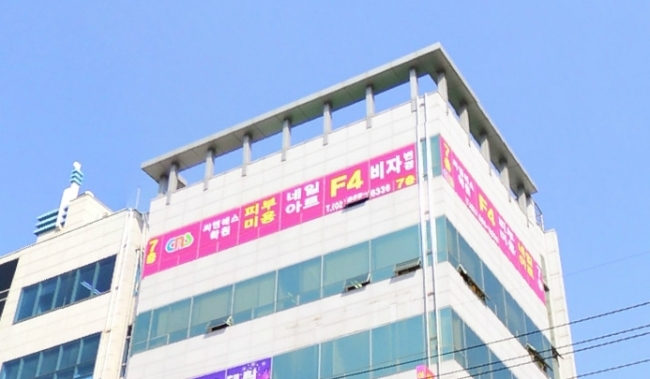Most Korean-Americans here did not cross the Pacific to flip burgers, but they might be surprised to learn that it isn’t even an option, based on the Justice Ministry’s latest list of banned jobs for F-4 visa holders.
Other jobs on the list include sommelier, postman and gym locker room attendant.
The restrictions were introduced in 2010 to protect local manual laborers from competition from ethnic Korean workers from China and other developing countries.
But the frequent changing of the list ― the latest version came into effect in February ― loopholes in oversight and the complexities in rules and exceptions cast doubt on whether the restrictions are realistic or sensible.
Other jobs on the list include sommelier, postman and gym locker room attendant.
The restrictions were introduced in 2010 to protect local manual laborers from competition from ethnic Korean workers from China and other developing countries.
But the frequent changing of the list ― the latest version came into effect in February ― loopholes in oversight and the complexities in rules and exceptions cast doubt on whether the restrictions are realistic or sensible.

F-4 visas had at first only been available to ethnic Koreans from developed countries, but this was ruled unconstitutional in 2001. The law was changed and the first F-4 visas were issued to Chinese-Koreans in 2008. Since then, the vast majority of applicants have been from China. As of January, 72 percent of the 293,000 F-4 visa holders in Korea had Chinese nationality.
Qualification for the F-4 visa for Chinese and other previously restricted nationalities requires proof that the applicant is not likely to work in manual jobs, such as a college degree, a high-ranking company position or professional certification.
However, there are gaps in the system. Those over 60 years of age do not require such certification, according to the Justice Ministry. In addition, holders of the H-2 visa for Chinese-Korean migrant workers can change to an F-4 visa without changing jobs, as long as they have worked for a certain period of time. This is an advantage, because workers can stay on an H-2 visa for a maximum of four years and 10 months, while an F-4 visa can be renewed indefinitely.
But H-2 visas are not issued for professional work.
Lee So-hoon, a Ph.D. candidate at the University of Sydney, says that this has been allowed to prevent a surge in the number of people in the country illegally.
“It is only in 2012 ― five years after implementation of the working visit visa (H-2) and when the first wave of H-2 visa holders were to have their visa expired ― that transition to F-4 visa from H-2 was made (widely) possible, in fear of having a large wave of Joseonjok (ethnic Korean) population overstaying their visas, which the Ministry of Justice projected prior to (the creation of) the H-2 visa,” she said.
“The question of course is that H-2 is exclusively designed for manual labor and F-4 claims to exclude manual labor workers.”
This also means that E-9 and H-2 visas are being issued to foreign nationals to do the work that F-4 visa holders are banned from doing.
Even H-2 visa holders without the option of continuing in their jobs can still seek F-4 status. An industry has sprung up in which hagwon offer training to H-2 visas to get professional certification that would allow them to apply.
This can have distorting effects on certain professions. Applications for the certification for metal window framing rose from 500 per year on average to 8,000 in 2012, a year before the Justice Ministry stopped accepting the license as an F-4 qualification, according to one media report.
Other reports say that many applicants do not know they cannot work in certain jobs on an F-4 visa, and that many vocational hagwon do not point this out.
Differences between jobs can also be obscure. Hand-washing laundry work is banned, but machine washing laundry work is not.
Workplaces may not be aware of the rules. Of six noraebang contacted by The Korea Herald, four were not aware that F-4 visa holders could not work there.
Added to that, the rules change frequently. For example, Lee said domestic workers had different rules for acquiring F-4 status in 2012, 2013 and 2014.
And while employers are supposed to register foreign workers on employment visas with the Labor Ministry, such a system doesn’t apply to the F-4 residence visa.
The Justice Ministry said that the punishment for violating the restrictions carried a maximum penalty of three years in prison or a fine of 20 million won ($19,000), but could not give examples of punishments being given and said it had no statistics on their enforcement.
By Paul Kerry (paulkerry@heraldcorp.com)
Kim Yu-ah contributed to this story. ― Ed.
-
Articles by Korea Herald




![[KH Explains] No more 'Michael' at Kakao Games](http://res.heraldm.com/phpwas/restmb_idxmake.php?idx=644&simg=/content/image/2024/04/28/20240428050183_0.jpg&u=20240428180321)






![[Grace Kao] Hybe vs. Ador: Inspiration, imitation and plagiarism](http://res.heraldm.com/phpwas/restmb_idxmake.php?idx=644&simg=/content/image/2024/04/28/20240428050220_0.jpg&u=)







